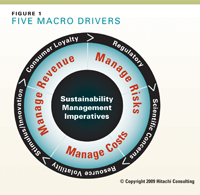Is Your Company Greening Up?: Todd Price, Hitachi Consulting
 In Newsweek's current Green Rankings report, the consumer products industry was conspicuously absent: only one company made the Top 10 while only two brands made the industry's Top 20 listing. This is surprising for three reasons:
In Newsweek's current Green Rankings report, the consumer products industry was conspicuously absent: only one company made the Top 10 while only two brands made the industry's Top 20 listing. This is surprising for three reasons: - Revenue results are directly impacted by improving and communicating environmental sustainability results
- Lowering operating costs and avoiding sudden operating cost increases are possible through proactive environmental sustainability planning and execution
- Environmental sustainability risks need coordinated decisions and actions for mitigation
Given the five macro drivers that are pressuring environmental sustainability management across U.S. corporations (see Figure 1), consumer goods companies must up their game to manage revenue, costs and risks at a new level of leadership focus and execution pace.
 U.S. companies can learn from the UK's ongoing carbon footprint label program, most noticeably at Tesco, which will soon have 500 products with prominently displayed carbon scoring labels. Tesco's program is responding to a consumer need and impacting purchase decisions, according to a recent L.E.K. Consulting study, which concluded that 56 percent of UK shoppers value details concerning a product's carbon footprint, and 44 percent would switch to a brand with a lower carbon footprint even if it was not their first preference. This represents a big first-mover's advantage, resulting in maintaining or shifting customer loyalty if done accurately and proactively.
U.S. companies can learn from the UK's ongoing carbon footprint label program, most noticeably at Tesco, which will soon have 500 products with prominently displayed carbon scoring labels. Tesco's program is responding to a consumer need and impacting purchase decisions, according to a recent L.E.K. Consulting study, which concluded that 56 percent of UK shoppers value details concerning a product's carbon footprint, and 44 percent would switch to a brand with a lower carbon footprint even if it was not their first preference. This represents a big first-mover's advantage, resulting in maintaining or shifting customer loyalty if done accurately and proactively.
In the United States, PepsiCo Inc.'s Frito-Lay division is working with the macro drivers to begin proactively managing operating costs associated with environmental sustainability. In one instance, it is taking advantage of a Connecticut stimulus grant under the Energy Independence Act, where businesses and governments are encouraged to install cogeneration systems to reduce demand on the Northeast power grid. Not only did Frito-Lay reduce demand on the grid at one of its largest potato chip plants, but it can now run the plant entirely off the grid. Through innovative use of gas turbines and the reuse of waste heat, Frito-Lay has turned a 300,000-square-foot production facility into a model of cost savings and lower environmental impact. Consider the bottom line savings if all plants eventually have no electric bill.
Despite early successes, environmental sustainability brings new risks that must be identified and managed carefully. Two recent studies show that in 10-K filings across the S&P 500 only 2.1 percent of companies identified one risk to their business associated with climate change or related regulatory changes. The SEC and large shareholders are concerned that companies are potentially liable for not addressing material environmental sustainability risks to their business.
The time to act is now as the EPA aggressively rolls out new CO2, water and chemical mandates as well as new regulatory reporting requirements. Meanwhile, U.S. Congress ramps up new legislation to curb greenhouse gas emissions. These bills will have a monetizing impact, either from a carbon tax or "cap and trade" standpoint.
